Early 1900s house at Derry Road and Trafalgar Road has been demolished
A previous post is entitled: Boarded-up early 1900s house (now demolished) at Trafalgar Road and Derry Road retained echoes of bygone days

Screenshot from Reddit link: Derry & Trafalgar house
May 2025 updates:
A site visitor named Samantha, who has a direct connection to the house, has shared a Reddit link with highly valuable details about this historic, now demolished, building:
A May 9, 2025 Milton Canadian Champion article is entitled: “WHAT’S GOING ON HERE? End of the line for this long-abandoned Milton mansion. The teardown has begun, with plans for a service station.”
The article opens with a photo of the ruins of the house.
At an earlier post about the house, I note that up until some years ago, a local paper in Milton would likely have been writing articles about this house thereby keeping local residents informed. In Life in the Trenches (2024), former reporter Bob Burtt highlights the history of The Canadian Champion, a newspaper that in its former print version shared local news years ago in Milton. Such papers formerly played a central role keeping local residents informed of issues and events, in a detailed and comprehensive way. I’m pleased that this paper has written a recent article about the house: it’s a great way to keep citizens involved.

Screenshot from Reddit link: Derry & Trafalgar house
In a comment, May 6, 2025, at the Comments section at the end of the earlier post about this house, Mark Tilbrook, writes: “well, it’s a sad day for the old house on Derry Road. I just drove by there and the house is completely gone demolished so terrible.”
Jocelyn Gordon in a message of May 6 has also shared the sad news: “my friend who drives by the home every day said that it came down today.”
We owe thanks to Mark for sending in the first photos as preparations for demolition began. We owe thanks as well for the additional photos which Mark and other site visitors have shared. As well, we owe thanks to Jocelyn Gordon for sharing historical details about the house along with recent photos.
I have posted, third item from top of the current post, an April 20, 2025 photo from Michelle Xu who writes: “I really love the work you’ve put into uncovering more about the house – my friend and I used to be so curious about it growing up, and I honestly thought we were the only ones who cared, haha.”
The third photo is a cropped image (cropped on Photoshop) of a photo Michelle emailed along with other photos.
What I especially like about the third photo that I’ve posted is that it tells a story – of a view of the house that you glimpse for a moment when travelling by car. The photo requires an effort of imagination on the part of a viewer such as myself.
Such a photo calls upon me, as an observer, to use my imagination to create a fuller picture. I need to think anew, as I look at the photo, about what this house means to me. I turn to my imagination, as I catch a fleeting, indistinct glimpse of the building in the photo as it stands behind some trees on the horizon.
It occurs to me that this is a metaphor for what is going on for us as we think about this house, and other houses dating back to 1905 and earlier. We call upon our imagination, and whatever bits of evidence-based details that may be available, to round out the story about this house of mystery.
Additional comments from Michelle
I have found all of the comments which have been shared over the years, and more recently as well, regarding this house are of much interest. I was interested to read the following additional reflections from Michelle. It’s so interesting to think of how many thoughts and reflections have arisen for people, over the years.
The comments I have read from so many sources are so very interesting and valuable. I have a much better sense now of the impact that the house has had, over so many years, and in so many ways.
I also think of places in Montreal that are now gone – but regarding which, memories remain, are cherished, and are widely shared.
In a message of April 23, 2025, Michelle has commented that “my friend and I would often pass it while on various trips. For me, it was usually on the way to the Toronto Premium Outlets or during family ski trips – we were always just passengers, but the house really stuck with us. There was something oddly eerie and lonely about it, just standing there by itself in the middle of a field. It really caught our attention, even in passing.”
Michelle adds:
I actually brought it up when my friend and I were first getting to know each other, and I was surprised when she knew exactly which house I was talking about. From then on, it became something we’d casually research together.
We’d search online trying to find any bit of information we could, but there wasn’t much out there, I remember that I had only found one forum of people discussing what might have happened to the house. Our conversations were usually just sharing little things we found online or interesting details we noticed when looking back through older Google Maps imagery. I remember one thing we noticed was that there used to be a smaller house right beside the main one – it had also been boarded up, similar to the Derry and Trafalgar house. But that smaller house was demolished sometime between 2010 and 2014, which made the main house feel even more mysterious to us.
You can click on photos to enlarge them.
Built Heritage Resources and Cultural Heritage Landscape document
I’ve recently searched for information regarding the house. A good resource is available if you do an online search for a document entitled:
BUILT HERITAGE RESOURCES & CULTURAL HERITAGE LANDSCAPES
BRITANNIA SECONDARY PLAN AREA
TOWN OF MILTON, ONTARIO
UPDATE
August 2021
Prepared for: Town of Milton
Prepared by:
WAYNE MORGAN
HERITAGE PLANNER
When I do a search for the entire above-noted text, the document appears at the top of the list of results; I have posted a couple of screenshots. It may be easier to access the document using a device (such as a laptop) other than a smartphone. The house is featured at a point deep in the Appendix. The information for the house includes a note that a barn on a separate property was demolished in 2015.
Usually I would provide a link to a document such as the one I’ve just described. In this case, however, the link would not connect to the document. This is a state of digital affairs that I have not encountered previously.
House at Agerton: the history
As well, in an April 12, 2025 message, Jocelyn Gordon noted:
Last year I did some research on the history of the house. It isn’t much, but I thought what I found was significant:
It was built by Robert Emery Hall and was in his family for over 100 years. The little community at the crossroads was known as Agerton (and prior to 1892, Auburn). The property was bought by Imperial Oil in 2009 but the gas station planned for there never materialized.
In an April 13, 2025 message, Jocelyn has shared details regarding sources for the above-noted summary:
The information about Imperial Oil came from an online forum in a post on Wed Mar 06, 2013 at 9:58 am by Colin Best who at the time described himself as:

Screenshot from online document: BUILT HERITAGE RESOURCES & CULTURAL HERITAGE LANDSCAPES, BRITANNIA SECONDARY PLAN AREA, TOWN OF MILTON, ONTARIO, UPDATE, August 2021
Local & Regional Councillor
Wards 2,3,4,5 North of Derry Road
Milton/Halton
Former Chair of the Milton Local Architectural Conservation Advisory Committee (LACAC) now Heritage Milton.
He said:
Sorry to burst the bubble of stories. But the original house on this thread 13008 Derry Road E. at the south-east corner of Derry & Trafalgar Road (built in 1905) was bought by Imperial Oil in 2009 from a previous owner. I inspected the house in the 1990s when the long time farming family owned it and it is quite the house.
At present there is no applications for the property which is not on the Town designated list of heritage properties.
P.S., yes it does have plumbing etc.
Also, on this same forum someone named Larry Hall is quoted (but I can’t locate his original post with date/time) as saying:
Hey everyone. My great Grandfather bought the 100 acre parcel at Derry and Trafalgar in the late 1800s. He built the house in 1905 and lived there till he died in 1928. My Grandparents took over the house at that time and raised their family. My parents took over the house in 1956 and my Dads two sisters built houses on the property also (one south trafalgar and one east derry). Our family lived in the house till 2005 (one hundred years). The house is owned by Esso now, and the land behind it is now owned by Greenpark homes. (The weird house up Derry rd on the left was also owned by a Hall family (cousins) but [they] moved about 25 years ago…… Larry Hall

Screenshot from online document: BUILT HERITAGE RESOURCES & CULTURAL HERITAGE LANDSCAPES, BRITANNIA SECONDARY PLAN AREA, TOWN OF MILTON, ONTARIO, UPDATE, August 2021
Jocelyn Gordon has also noted that the following two documents provide information about Agerton being Auburn prior to 1892.
Parcel_J_Heritage_Impact_
As well, the following links provide details about the barn (demolished in 2015) associated with the property:
https://images.ourontario.ca/
An excerpt from the above-noted link reads:
Description
Taken in 1988.
The star on the barn says this is Auburn Farm. The December 2014 Heritage Milton Minutes Report No. 011 discusses Auburn Farm and its connection with the farm of Robert Emery Hall on page 5.
At the time of this 2014 report, the barn was in poor condition and The Town of Milton recommended that photographs and materials of interest be taken for heritage information. It was demolished in 2015.
The address is given as 13008 Derry Road. The farm was in Agerton on the south-east corner of Derry and Trafalgar Roads.
[End of excerpt]
https://images.ourontario.ca/TrafalgarTownship/3543748/image/3725161
Please note: You may not be able to view the entire contents of the above-noted links on a smartphone. On other devices, you can view the entire scope of the information.
Recent photos
With help from site visitors Mark Tilbrook, Heather B, and Jocelyn Gordon, we now have recent updates on the ongoing work at this heritage house.
The book Curated Decay (2017) is highlighted at the previous post. I’ve been thinking of the concept on which the book is based.

Auburn Farm Barn on Derry Road Near Trafalgar Road, 1988. When the barn was demolished in 2015, “photographs and materials of interest [were to] be taken for heritage information.” Image source: https://images.ourontario.ca/TrafalgarTownship/3543748/image/3725161
Heather B notes that in less than a week, two sides of brick have been torn down.
If anyone has additional information about the house, please let us know.
If anyone wishes to take more photos of the house as it is now, please send a selection to me at jpill@preservedstories.com – a jpeg format of about 1MB in size works well. Captions could include date of photo and name of photographer. I like to include details regarding source of photo when possible.
Years ago I served as editor of a student newspaper in British Columbia. As a blogger, I continue to play an editor role when I’m working in collaboration with site visitors. As always, I keep in mind the value of fact-checking, and the value of an even-handed assessment of sources.
Glenclare Farmhouse
Mark Tilbrook has shared a link to a March 10, 2022 notice at the Corporation of the Town of Oakville website: Glenclare Farmhouse – Intention to Designate as Property of Cultural Heritage
An excerpt from the notice reads:
The Glenclare Farmhouse at 4243 Sixth Line is located on the east side of Sixth Line, north of Burnhamthorpe Road, south of Highway 407 in the Town of Oakville. The Farmhouse is a two-storey structure with stone foundation, red brick cladding, hipped roof with asphalt shingles, and contains a single-storey frame tail section with stone foundation at the rear. The Farmhouse was constructed in 1898, according to the date stone set into the front façade.
Memories of places now gone
I’ve explored another concept aside from ‘curated decay’ at a recent post about Cartierville School and the Marlborough Golf and Country Club in Montreal. I attended the latter school in the mid-195os and occasionally worked at the nearby golf course as a caddy for about $1.25 per round of golf. What I’m thinking about are the stories that remain in the memories of people connected with places now gone. These are stories well worth sharing.
The latter school and golf course in Montreal are now physically absent from the local scene. The school, which was long ago closed, burned down in 2024. The golf course was sold years ago. What remains after the physical features are gone, in particular circumstances – what remains are the memories that we have the occasion to share among us.
Earlier comments about house at Derry and Trafalgar
The earlier post about the house at Derry and Trafalgar includes, in the Comments section, messages from former residents who share interesting reflections about the history of the house they lived in. At another previous post, Dan McPhail of Milton (who attended same high school in Montreal as I did years ago) has commented:
Dan: It’s a nice house. When we first moved there [to Milton], there was people – when we first moved to Milton, there was a family in there.
Jaan: What year was that?
Dan: That would have been somewhere around – from 2004 to maybe 2007.
Jaan: That’s amazing.
Dan: And, if I can recall, they put in a swimming pool – like one of the above-ground swimming pools.
Jaan: Oh, yeah, that’s neat.
Dan: So, it wasn’t dormant that long and then, it just – and it was up for sale a couple of times.
Jaan: That’s really interesting. I looked around. There’s a few others off the main road, you know, that, again, are abandoned. But they’re beautiful houses, and you think of all the history.
Eastwood Hotel, Bois-de-Saraguay, Small Arms Building, former Parkview School
I’m also reminded of the Eastwood Hotel in Long Branch in Toronto. The hotel is gone but the memories – as documented at a post about the hotel – live on in conversations among people who used to spend time at this hotel years ago. The latter post features photos made with a Nikon 35mm camera, of the hotel in the process of being demolished.
I’m also reminded of the story of how the Bois-de-Saraguay on the Island of Montreal was saved from destruction years ago.
As I was thinking about the house at Trafalgar Road and Derry Road, I was also reminded of buildings that remain intact, in some cases after close calls.
Among the stories at this website is an account of how the Small Arms Building in Mississauga was about to be demolished in 2008 but word reached Jim Tovey who contacted the City of Mississauga just in time.
Similarly, residents in Long Branch learned that the former Parkview School was liable to be demolished; the local residents worked together with the provincial government of the time to ensure the school property remained in public hands.
I’ve also spoken at this website about how heritage houses in South Etobicoke such as at 58 Wheatfield Road got to be saved as a result of local residents working together to preserve heritage properties. Another building that got saved years ago was Toronto’s Union Station.
I’m also reminded of how the parkland along the Avon River got to be saved years ago in Stratford, Ontario, setting the stage for the launch of the Stratford Festival in 1953.
It’s good to be involved in a collaborative effort to document the ongoing work at the house in question. The Comments section at the end of the previous post has interesting reflections about the history of the house; the updates shared by site visitors are very valuable.

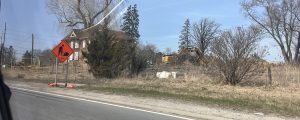

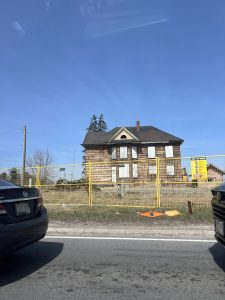


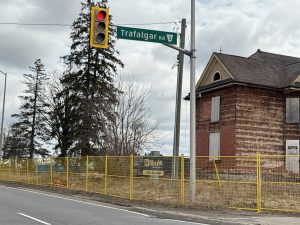
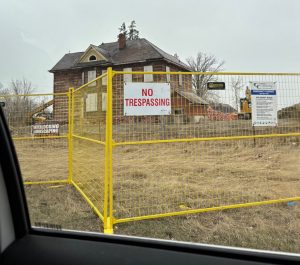
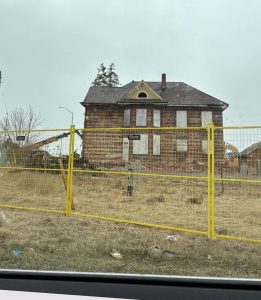
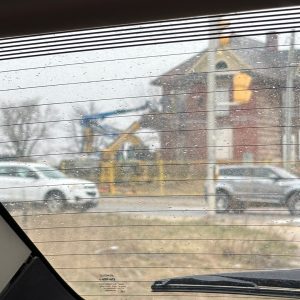
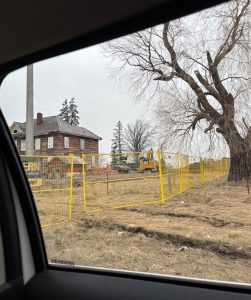
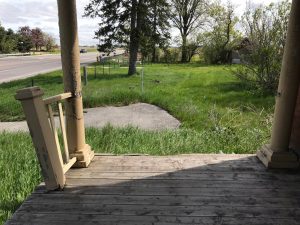
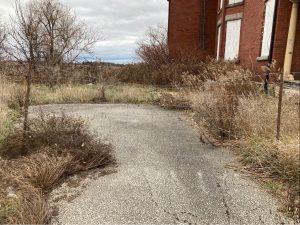
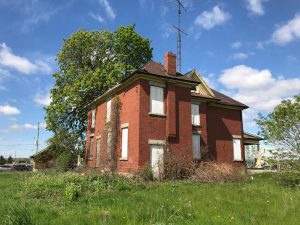
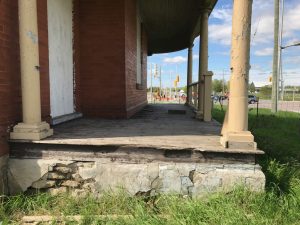
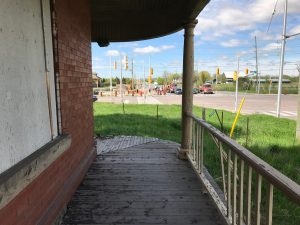
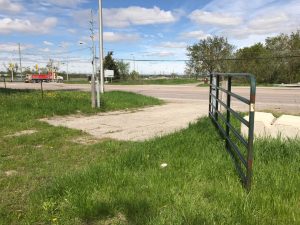
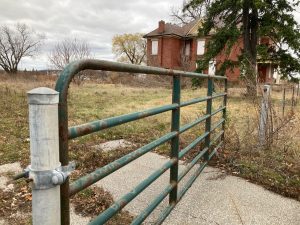
Some additional thoughts come to mind for me regarding houses. We are not in wartime in Canada at the moment. I have thought, however, about stories I have heard, where houses are pictured differently as compared to peacetime conditions.
I can picture, for example, the life at this house and similar houses in this part of Southern Ontario during the First World War; a post from January 2024 outlines features of life in this region of the province in those years; the post is entitled:
A Township at War (2018) describes daily life inside of (and also far, far away from) the southern Ontario township of East Flamborough during the First World War
Some years ago, I was power of attorney for a family friend who lived to be 99 years old. She was born and grew up in Estonia, one of the Baltic countries located south of Finland across the Baltic Sea from Sweden. During the years between the First and Second World Wars, Estonia, Latvia, and Lithuania were independent countries. After the Second World War, they were occupied by the Soviet Union. With the collapse of the Soviet Union in December 1991, these countries regained their independence.
When the Soviet Union was about to occupy Estonia for a second time during the Second World War in 1944, my friend along with some tens of thousands of other Estonian citizens, my parents among them, fled the country as refugees by whatever means available to them. My friend, who was in her mid-twenties at the time, once described for me the experience of fleeing one’s home under such conditions.
She said, and I paraphrase: “It was like you’re on the second floor of your family’s house. The house is on fire, flames all around you – you’re on the second floor. What do you do? You jump out the window and make a mad dash for it – and you keep on running, fast as you can; you never stop. You do whatever you can to save your life.”
One time I took my friend to a medical appointment where we got talking with the physician who met with my friend that day. We got talking about the fact my friend was from Estonia. The physician spoke of someone he had spoken with – it might have been a patient of his – who had a connection with one of the Baltic countries: I think it may have been Lithuania.
The story the physician shared concerned a schoolgirl who had been walking home from school one day, during the Second World War, either at lunchtime or at the end of the school day. As she was walking toward her house, she saw a Soviet tank positioned on a nearby roadway. All at once, the tank fired a shell and the house burst into flames. The girl turned around, walked back toward the school.